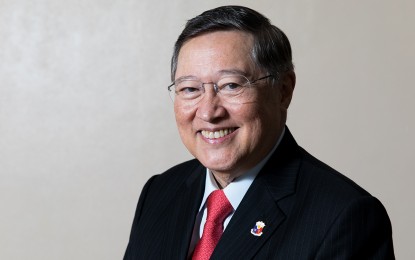
DOF Secretary Carlos Dominguez III
MANILA – Department of Finance (DOF) Secretary Carlos Dominguez III said Wednesday the next administration will inherit a slew of President Rodrigo Duterte’s “hard-won” reforms, which include several economic liberalization measures to help fuel the Philippines’ resurgence in the years ahead.
These reforms include the Duterte administration’s comprehensive tax reform program (CTRP), the flagship “Build, Build, Build” infrastructure modernization, "sin" tax reform, rice tariffication, a national identification (ID) system and the Ease of Doing Business (EODB) law, among others, he said.
Dominguez also cited the three economic liberalization bills recently approved by Congress that aim to boost the competitiveness of industries, create more jobs, promote the affordability and quality of consumer goods, and accelerate growth.
These are the amendments to the Retail Trade Liberalization Act (RTLA), which has been enacted; and the respective amendments to Foreign Investments Act (FIA) and the Public Service Act (PSA), which are expected to be signed into law by the President soon.
“Let me emphasize that the Philippine economy faces exciting times ahead. We have risen from an economic downturn and opened the door to rapid expansion. Our enterprises are ready to compete with the best in the world. Our people are ready to work hard to progress,” Dominguez told the newly inducted officers and members of the Philippine Chamber of Commerce and Industry (PCCI).
“For our part, we promise you that President Duterte’s economic team will persevere until the last hour of this administration. We are confident that we will leave public office with the basic groundwork for continued and rapid growth in place. The next president will inherit many hard-won reforms that will boost our economic resurgence,” he added.
Dominguez underscored the invaluable contributions made by the business community in the crafting of the Duterte administration’s tax reform program and other game-changing economic measures which, in turn, helped the country maintain financial strength to weather the worst of the pandemic-induced crisis.
He specifically cited the “actionable recommendations” submitted by the PCCI to the government during the previous 13 Sulong Pilipinas consultative workshops.
Dominguez said he expects PCCI to continue working closely with the next administration “to ensure that the right policies are implemented.”
“We commit to helping make the coming transition as seamless as possible,” he said.
Dominguez said many of Sulong’s top actionable recommendations have now become laws, “the majority of which sat on legislative shelves for decades due to the lack of political will to break the typical congressional gridlock.”
These laws have helped transform the Philippines into one of the fastest-growing economies in Asia, with the country even poised to attain upper-middle-income status in 2020, when the pandemic struck, he said.
“The Covid-19 (coronavirus disease 2019) pandemic pushed our timeline back, but only temporarily. When the health crisis struck, your actionable recommendations had helped us gain the financial strength to weather the worst of the crisis. In any battle or emergency, preparation is always the best strategy,” he added.
In response to such actionable recommendations, Dominguez said the Duterte presidency is the only administration in the country’s history that was able to decisively pass and implement the most comprehensive tax reform program ever.
The first CTRP package –the Tax Reform for Acceleration and Inclusion (TRAIN) Law– reduced personal income taxes for 99 percent of workers, giving them much-needed relief after 20 years of non-adjustment.
The second -- the Corporate Recovery and Tax Incentives for Enterprises (CREATE) Act -- became the largest economic stimulus program for businesses by drastically reducing corporate income taxes (CIT) and finally modernizing the fiscal incentives system. (PR)
